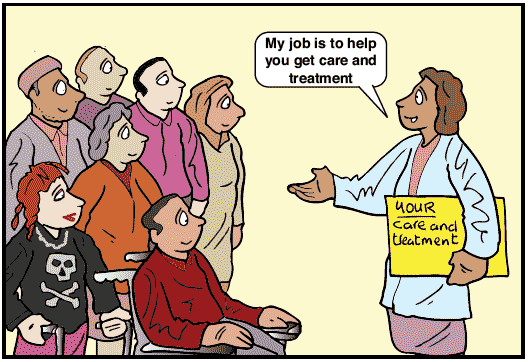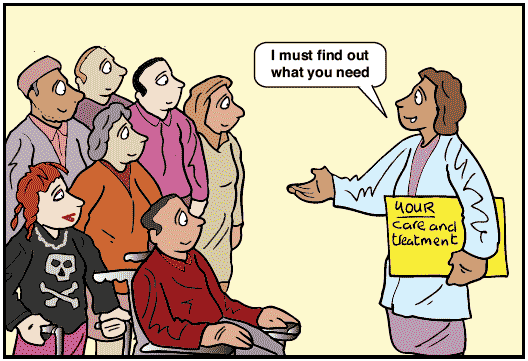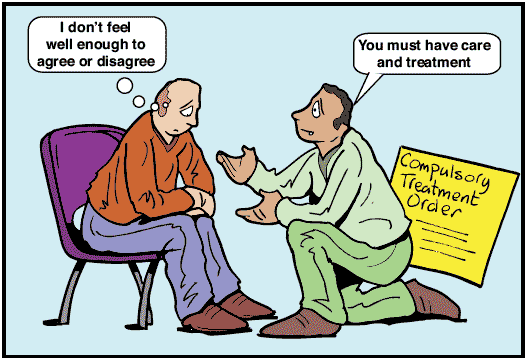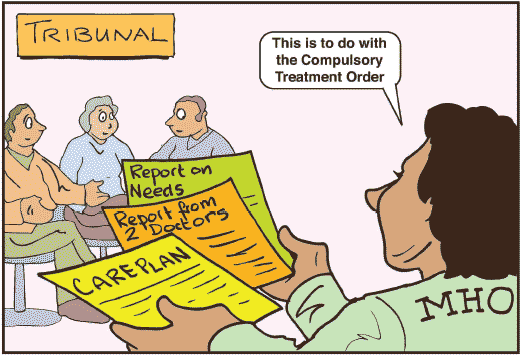Mental Health Act: easy read guide
An easy read guide to the Mental Health Act.
06 Mental health officer

- What is a mental health officer?
- When might I have a mental health officer?
- What does my mental health officer do?
- Emergency and short-term powers
- Compulsory treatment orders
- People involved with police and courts
- Can I change my mental health officer?
What is a mental health officer?
A mental health officer is a social worker who has special training and experience in working with people who have a mental disorder.
When might I have a mental health officer?
If you become ill and do not agree to treatment, you can be put under compulsory measures. For example you can be:
- held for a short time for doctors to examine you
- given treatment even if you do not want it
- taken into hospital for treatment even if you do not want to.
If this happens your social work department must appoint a mental health officer to help you.

What does my mental health officer do?
Your mental health officer:
- finds out what you need
- tells you about your rights
- writes reports and care plans
- agrees that you need to be examined by a doctor
- asks for you to have a compulsory treatment order if you need this. This means you have treatment even if you do not want it.

Emergency and short-term powers
- If you are living in the community and become ill your mental health officer must find out if you need care and treatment.
John is living at home but he is ill. Ali, his mental health officer, must find out what John needs. Ali asks the court for permission to come into John's home. He also asks the court for permission for a doctor to examine John.
- Emergency detention certificate
This means you can be kept in hospital and have treatment for no more than ![]() 3 days.
3 days.
John's doctor decides that he needs an emergency detention certificate. The doctor asks Ali, his mental health officer, if he agrees. Ali talks to John and the doctor and then tells the doctor he agrees.
- A short-term detention certificate
This means you can be kept in hospital and given treatment for up to ![]() 28 days.
28 days.
The doctor wants to put John on a short-term detention certificate. The doctor asks Ali, his mental health officer, if he agrees. Ali talks to John and tells him about his rights to a named person, an independent advocate or a solicitor. He helps John to find these people to help him. Ali talks to the doctor and tells him he agrees.
Compulsory treatment orders
Your mental health officer may decide that you need a compulsory treatment order.
Your mental health officer asks the Mental Health Tribunal to decide if you need compulsory treatment. The Tribunal is the organisation that decides about the compulsory treatment of people with mental disorder.

If your mental health officer asks for a compulsory treatment order they should:
- tell you and your named person
- tell you about your rights
- help you find an independent advocate
- help you find a solicitor
- help you find extra communication support if you need it.
If you are involved with the police or courts
If you are involved with the police and the courts, they must:
- make sure you have a mental health officer to help you
- ask your mental health officer for advice
- ask your mental health officer to prepare a Social Circumstances Report. This is a special report which has all the information about your situation - past and present. The mental health officer must prepare this within
 21 days if you are put under an order by the court.
21 days if you are put under an order by the court.
The mental health officer gives this report to the court to help them decide what to do about your care and treatment. They give a copy to you, your doctor and the Mental Welfare Commission.
If your mental health officer decides this report would not be useful he/she must tell the Mental Welfare Commission and your doctor.
Your mental health officer gives advice and reports if you are put under any of these orders by the court:
- Assessment Order
- Treatment Order
- Interim Compulsion Order
- Compulsion Order
- Restriction Order
- Hospital Direction
- Transfer for treatment
You can read more about these orders on page 87.
Can I change my Mental Health Officer?
Yes. If you cannot work with your mental health officer your social work department helps to sort out the problem or chooses a new mental health officer for you.
You may want to change your mental health officer because you do not agree with his/her decisions. A new mental health officer may make the same decisions about your care and treatment.
There is a problem
Thanks for your feedback